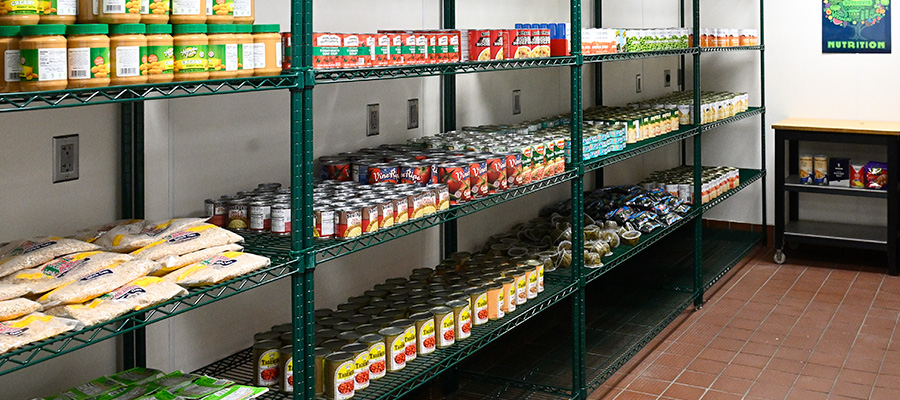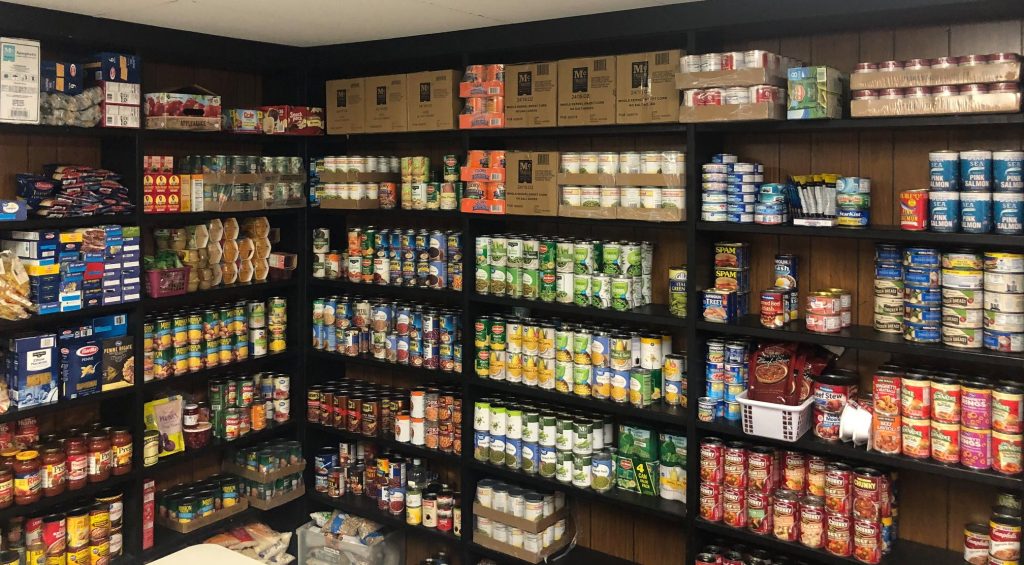Exactly How Food Pantries Supply Vital Resources for Households in Dilemma
Food pantries function as a critical lifeline for family members experiencing situation by using not only food but also a series of necessary sources developed to support their long-lasting and immediate demands. These community-based companies offer accessibility to healthy alternatives, academic programs, and recommendations to additional solutions that can improve family security. Comprehending the multifaceted role of food kitchens raises vital concerns about their influence and the wider area dynamics at play. Exploring these elements reveals an intricate web of assistance that prolongs much beyond plain food distribution. What does this mean for families in dilemma?
Comprehending Food Instability
Food insecurity, a pressing problem influencing millions of households, describes the absence of consistent access to sufficient food for an energetic, healthy and balanced life. This condition can come from numerous variables, including economic instability, unemployment, and increasing living prices, which limit individuals' ability to buy or acquire nourishing food. Consequently, families dealing with food insecurity often rely upon inadequate food sources, causing inadequate nutritional selections and adverse health outcomes.
The ramifications of food instability prolong beyond instant hunger. It can negatively affect youngsters's development and growth, adding to cognitive and behavior issues. Adults experiencing food insecurity might deal with chronic health troubles, such as weight problems, diabetic issues, and cardiovascular conditions, as they resort to more affordable, less nutritious food alternatives.

Services Used by Food Pantries
Attending to food insecurity requires a complex technique, and food pantries play a vital duty in offering immediate alleviation to households in crisis. These essential solutions provide a selection of sources focused on relieving appetite and supporting total well-being.
Largely, food kitchens distribute healthy food items, consisting of fresh produce, tinned products, and non-perishable things. Lots of pantries focus on healthy and balanced choices, understanding the relevance of proper nourishment in keeping psychological and physical health and wellness. In addition, some food pantries use specialized programs accommodating details populations, such as family members with young children or senior citizens, making certain that the special nutritional requirements of these teams are met.
Along with food circulation, several pantries supply supplementary solutions, such as accessibility to nutrition education workshops, food preparation courses, and recipe-sharing initiatives. These programs equip households to make use of and make informed choices pantry sources efficiently. Furthermore, some food pantries collaborate with neighborhood organizations to use support in areas like economic proficiency, work training, and real estate support, resolving the more comprehensive obstacles that contribute to food insecurity.
Via these comprehensive services, food pantries not just reduce cravings but also foster resilience and self-sufficiency in families facing tough situations.
The Relevance of Area Assistance
Neighborhood assistance is critical in combating food instability, as it cultivates a network of resources and support that expands past the immediate offerings of food kitchens. This joint framework includes regional organizations, services, and volunteers that add time, funds, and goods to improve food pantry operations and outreach initiatives.
When communities come with each other, they develop a robust safeguard for households in situation. Assistance from regional services can cause donations of excess food and monetary contributions, which assist keep kitchen inventories and expand services. In addition, partnerships with institutions and wellness organizations can assist in education and learning around nourishment and health, encouraging family members to make his comment is here educated selections.
When individuals feel sustained by their next-door neighbors, they are more likely to access food cupboard sources without worry or humiliation. Eventually, the value of area assistance can not be overemphasized; it is the backbone that strengthens the work of food cupboards and boosts their effect on those encountering food instability.
Just How to Accessibility Food Kitchen Resources
Accessing food pantry resources can significantly relieve the burdens faced by family members in situation. To begin, individuals seeking aid should identify neighborhood food pantries, which are usually detailed on social work websites or can be located with an easy web search (Food Pantry Lockhart). Many kitchens are associated with bigger companies, such as the United Way or Feeding America, which can offer more assistance


Furthermore, lots of food pantries offer services past food distribution, such as nutritional education and recommendations to various other social solutions. When checking out a cupboard., families need to inquire concerning these added resources.
Influence On Family Health
The schedule of food kitchen resources plays an important role in enhancing the total wellness of families in situation. Accessibility to nutritious food reduces prompt appetite, which is foundational for physical wellness. When households receive ample food assistance, they experience a reduction in stress and anxiety pertaining to food insecurity, permitting them to focus on other important elements of their lives, such as work and education.

The impact of food cupboards prolongs beyond the specific to the household unit. By making certain that basic nutritional demands are satisfied, family members can involve much more fully in their day-to-day lives, promoting much better scholastic performance for children and improved task stability for grownups (Food Pantry Lockhart). Ultimately, food cupboards function as essential lifelines, substantially adding to the general well-being and durability of families dealing with crisis
Final Thought
Food cupboards offer as vital lifelines for families experiencing dilemmas by attending to prompt food instability and advertising long-term stability. Through the provision of healthy food, academic programs, and references to added solutions, these cupboards add dramatically to the overall well-being of individuals and families.
Food cupboards offer as a crucial lifeline for families experiencing crisis by offering not only food but important link also a range of essential resources designed to sustain their prompt and lasting requirements.Mostly, food kitchens distribute healthy food products, including fresh produce, tinned items, and non-perishable products. Some food kitchens collaborate with local companies to offer aid in locations like monetary literacy, work training, and real estate support, dealing with the broader obstacles that add to food insecurity.
Ultimately, other the relevance of neighborhood support can not be overemphasized; it is the backbone that reinforces the work of food cupboards and improves their impact on those dealing with food insecurity.
Food kitchens serve as crucial lifelines for families experiencing situations by dealing with prompt food insecurity and advertising long-term security.